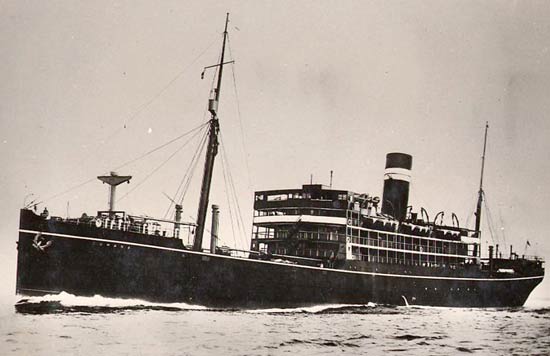Dumana
British Seaplane tender

Photo Courtesy of Library of Contemporary History, Stuttgart
| Name | Dumana | ||
| Type: | Seaplane tender | ||
| Tonnage | 8,427 tons | ||
| Completed | 1923 - Barclay, Curle & Co, Whiteinch, Glasgow | ||
| Owner | British India Steam Navigation Co Ltd, London | ||
| Homeport | Glasgow | ||
| Date of attack | 24 Dec 1943 | Nationality: | |
| Fate | Sunk by U-515 (Werner Henke) | ||
| Position | 4° 27'N, 6° 58'W - Grid EU 8372 | ||
| Complement | 169 (39 dead and 130 survivors). | ||
| Convoy | STL-8 (straggler) | ||
| Route | Port Etienne - Freetown (20 Dec) – Marshall, Liberia (23 Dec) - Takoradi | ||
| Cargo | 300 tons of RAF stores | ||
| History | Laid down as motor passenger ship Melma, completed in March 1923 as Dumana for British India Steam Navigation Co Ltd, London. Used on the routes from London to Karachi and Bombay and after 1934 to Calcutta. In September 1939 the ship was requisitioned as troop transport by the Ministry of War Transport (MoWT) and chartered by the Air Ministry as base ship for 500 airmen with workshops for aircraft overhaul in Port Said, later Alexandria, Malta and Gibraltar. In March 1941 used to evacuate RAF personnel from Crete. 1942 converted to a base ship for Sunderland flying boats and stationed in Bathurst and later Port Etienne with two RAF Squadrons. | ||
| Notes on event | At 21.37 hours on 24 Dec 1943 the Dumana (Master Otto West) was hit on the starboard side in #2 and #3 holds by two of three torpedoes from U-515 while steaming on a non-evasive course at 8.5 knots in a very dark night about 70 miles west-southwest of Sassandra, Ivory Coast. The ship had been in convoy STL-8 but lost contact with the main convoy together with the armed trawlers HMS Arran (T 06) (Lt W.G.N. Aplin, RNR) and HMS Southern Pride (K 249) (Lt G.B. Angus, DSC, RNVR). Despite of warnings about U-boat activities in the area the torpedo nets of the vessel were not streamed and her escorts were unable to detect the U-boat which had even missed one of them with a Gnat torpedo fired at 21.18 hours. The torpedo explosions blew away the starboard wing of the bridge, destroyed two of the starboard lifeboats and collapsed many of the wooden ladders to the troop decks, probably trapping some men in the mess decks. While the engines remained intact, the generators were apparently disabled as all lighting and communications immediately failed. The Dumana quickly began to list heavily to port, so the crew secured the engines and began to abandon ship. They launched #2, #6 and #8 lifeboats successfully but #5 was capsized by wreckage when reaching the water. However, the temporary houses on the shade decks broke adrift due to the list, slid overboard and fell onto the boats lying alongside, damaging the boats and killing some of the occupants. Other boats were dragged down with the ship when she sank by the bow in less than 7 minutes after being hit. Only the motorboat floated free and 40 survivors managed to climb into it. HMS Southern Pride screened the rescue operation of HMS Arran, which picked up the master and about 60 other survivors swimming in the water, leaving those who were safe in boats or on wreckage until the following morning. At daylight, both trawlers continued the rescue operation and picked up the remaining survivors, made a thorough search of the area until 11.30 hours and left for Takoradi, arriving in the evening on 26 December. The ship carried a crew of 36 Europeans and 103 Lascars, 21 RAF maintenance personnel and nine gunners (the ship was armed with one 4in, one 12pdr, four 20mm and four machine guns). 13 European crew members, 17 Lascars, two gunners and seven RAF personnel were lost. | ||
| On board | We have details of 42 people who were on board. | ||
If you can help us with any additional information on this vessel then please contact us.
